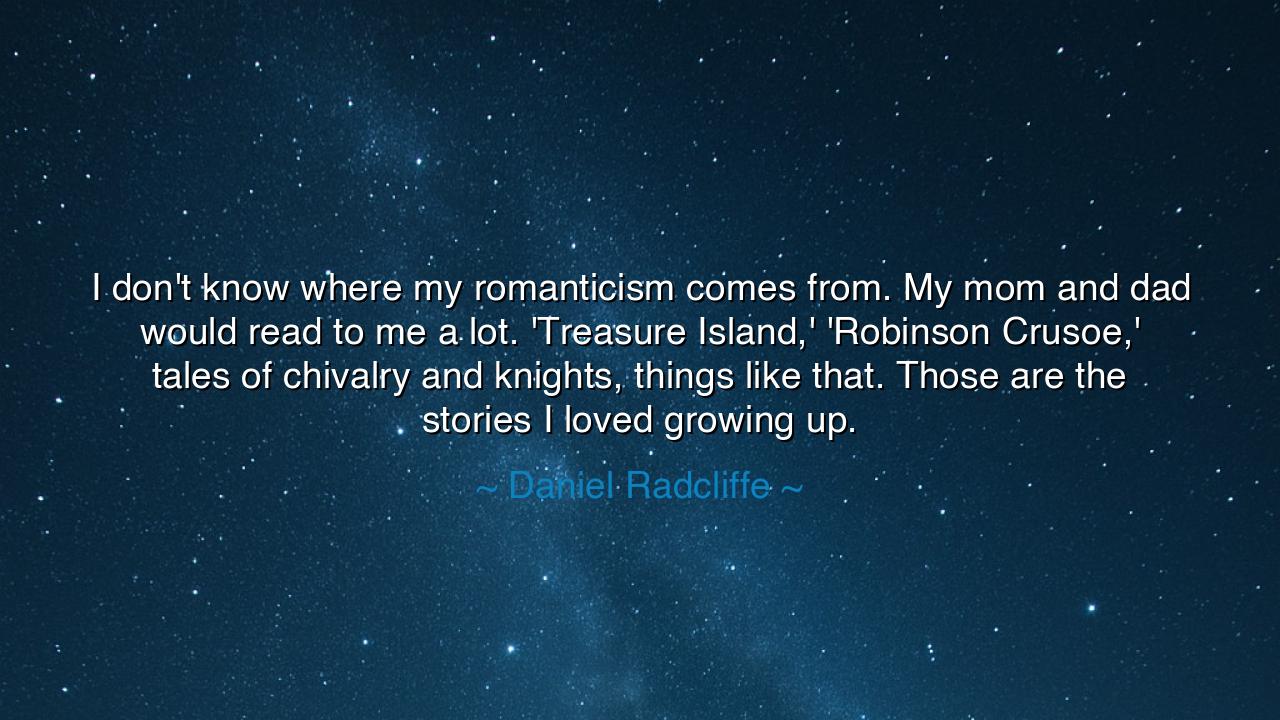
I don't know where my romanticism comes from. My mom and dad
I don't know where my romanticism comes from. My mom and dad would read to me a lot. 'Treasure Island,' 'Robinson Crusoe,' tales of chivalry and knights, things like that. Those are the stories I loved growing up.






The words of Daniel Radcliffe open a window into the mystery of the human heart: “I don’t know where my romanticism comes from. My mom and dad would read to me a lot. Treasure Island, Robinson Crusoe, tales of chivalry and knights, things like that. Those are the stories I loved growing up.” In this confession, we glimpse the origin of romanticism not as an accident, but as the fruit of stories whispered in childhood, planted deep in the soil of imagination, and watered by love. He testifies that the spirit of romance—the longing for adventure, nobility, and wonder—was born in him through the power of stories.
The ancients knew this truth well: that the tales told to the young shape the souls of men and women for all their lives. When Radcliffe speaks of Treasure Island and Robinson Crusoe, he is invoking the call to adventure, the spirit of the sea, the courage of one who dares the unknown. When he names knights and chivalry, he speaks of honor, loyalty, and devotion to a cause higher than oneself. These stories do not merely entertain; they engrave values upon the heart. They whisper to the child: “There is more to life than safety. There is glory, there is love, there is sacrifice worth making.”
Consider the story of Alexander the Great. As a boy, he read the tales of Achilles and dreamed of greatness. So deep did those stories lodge in his soul that he carried a copy of the Iliad with him wherever he went, laying it beneath his pillow as though it were a sacred talisman. It was not mere history that inspired him, but the romanticism of epic tales—the vision of a life larger than itself, of a destiny forged in fire and struggle. In the same way, Radcliffe reveals that the stories told to him by his parents awakened his own longing for greatness, adventure, and a world touched by wonder.
But there is also humility in his words: “I don’t know where my romanticism comes from.” For indeed, none of us fully know where the seeds of our soul are planted. A story told, a book read, a song heard in childhood may awaken something eternal within us. The origins of romance are mysterious, yet their fruits are unmistakable: courage, imagination, tenderness, and the ability to see life as more than survival. Radcliffe’s admission reminds us that we are all shaped by what we take into our hearts in youth, and that the tales we love become the compass of our lives.
His words also carry a warning. For if the soul is shaped by stories, then what stories are we telling the young today? If they are fed only tales of despair, violence, or cynicism, will they grow to believe in honor, sacrifice, and love? But if they are given stories of knights, chivalry, and adventure, they will carry within them a flame of hope, even when the world grows dark. The stories we choose are not idle; they are the architecture of the future.
The lesson is clear: guard your imagination, and nurture it with tales that lift you. If you are a parent, tell your children stories of courage, love, and nobility. If you are grown, do not abandon the stories of your youth—return to them, for they still hold power. Pick up an old book, let it remind you that life is not only toil but also adventure. Let your heart be stirred by knights who fight for honor, by sailors who brave the sea, by heroes who dare the impossible.
Therefore, let all who hear take this wisdom: Feed your soul with what is noble, and you will become noble. Let your romanticism be a flame that lights your path, born from the stories of the past but alive in your actions today. Like Radcliffe, do not scorn your youthful love of tales—embrace it. For in those tales lies the eternal call: to live bravely, to love deeply, and to walk this life not as a weary traveler, but as a knight on a quest. And such a life, my children, is the very essence of romance.






AAdministratorAdministrator
Welcome, honored guests. Please leave a comment, we will respond soon